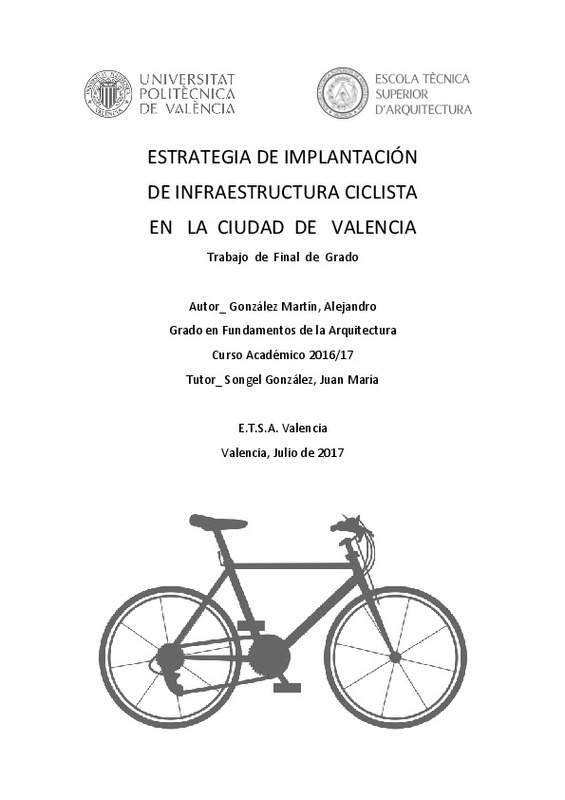JavaScript is disabled for your browser. Some features of this site may not work without it.
Buscar en RiuNet
Listar
Mi cuenta
Estadísticas
Ayuda RiuNet
Admin. UPV
Estrategia de implantación de infraestructura ciclista en la ciudad de Valencia
Mostrar el registro sencillo del ítem
Ficheros en el ítem
| dc.contributor.advisor | Songel Gonzalez, Juan María
|
es_ES |
| dc.contributor.author | González Martín, Alejandro
|
es_ES |
| dc.coverage.spatial | east=-0.3762881000000107; north=39.4699075; name=Pl. de l'Ajuntament - Font, 46002 Valencia, Espanya | es_ES |
| dc.date.accessioned | 2018-05-16T15:28:42Z | |
| dc.date.available | 2018-05-16T15:28:42Z | |
| dc.date.created | 2017-07-13 | |
| dc.date.issued | 2018-05-16 | es_ES |
| dc.identifier.uri | http://hdl.handle.net/10251/102042 | |
| dc.description.abstract | [ES] La bicicleta es un fenómeno contemporáneo para el que las ciudades no están adaptadas. A través de este trabajo de investigación, se busca desarrollar las estrategias de inserción de la bicicleta como medio de transporte en la ciudad de Valencia para así entender mejor como está evolucionando una metrópoli en la que predomina el tráfico motorizado. Tras estudiar el desarrollo histórico reciente de la infraestructura ciclista, es importante situar la bicicleta en la sociedad actual. Conceptos como Sostenibilidad, Ecología y Salud están indiscutiblemente ligados a este medio de transporte. Estos ideales son relativamente recientes y las ciudades tratan de satisfacerlos por diferentes medios. Es relevante no perder de vista las ciudades que ya incorporan una estructura ciclista asentada, ya que nos revelan los pasos a seguir para llegar a ese nivel. El objetivo principal de esta investigación es desarrollar la estrategia actual fomentada localmente, además de proponer una nueva aproximación basada en las propuestas de otras ciudades del ámbito nacional. Es importante catalogar el plan de actuación que se está llevando a cabo y comprobar si el punto de vista es el óptimo para el usuario, tanto ciclista como peatón. Por otra parte, en muchas ciudades del panorama nacional como San Sebastián o Sevilla se han realizado importantes modificaciones a sus tejidos urbanos buscando adoptar una creciente demanda de infraestructura ciclista. Comparándolas con el planteamiento local, podremos determinar las medidas más prometedoras para adaptar la ciudad y así elaborar un criterio de actuación. Finalmente, la conclusión elaborará una valoración crítica tanto de la estrategia actual como de la propuesta, reuniendo los aspectos positivos de ambas buscando reconciliarlas. Se trata de buscar un conjunto de acciones que faciliten una ciudad más peatonal y ciclista que vaya alejando al coche de su núcleo, para crear una nueva identidad urbana. | es_ES |
| dc.description.abstract | [EN] The bicycle is a contemporary phenomenon to which the cities are not adapted. The purpose of this investigation report is to develop the strategies of inserting the bicycle as a mean of transport in the city of Valencia, in order to understand how a metropolis dominated by motorized traffic is evolving. After studying the recent historical development of the cycling infrastructure, it is relevant to place the bicycle in the actual society. Concepts like Sustainability, Ecology and Health are undoubtedly related to this vehicle. These ideals are relatively recent and cities struggle to satisfy them through different paths. It is vital not to lose sight of the urban areas that already have a settled bicycle network, because they will reveal the steps to reach their level. The main objective of this investigation is to insight into the strategy fomented locally, besides proposing a new approximation based in the schemes of other cities of the national panorama. It is important to categorize the plan that is being implemented and to check if the point of view adopted benefits the user, both cyclist and pedestrian. Furthermore, many other metropolis of the national sphere, such as San Sebastian and Seville, have made important modifications to their urban fabric aiming to satisfy the growing demand for bicycle infrastructure. Comparing those models with the local one, we can determine the most promising initiatives to adapt the city and thereby create action criteria. Finally, the conclusion will elaborate a critical evaluation of the actual and proposed strategies, gathering the positive aspects of both of them pursuing their reconciliation. The purpose is to collect a set of actions that will provide a more pedestrian and cyclist city, which simultaneously will gradually expulse the car out of its nucleus, creating a new urban identity. | es_ES |
| dc.format.extent | 59 | es_ES |
| dc.language | Español | es_ES |
| dc.publisher | Universitat Politècnica de València | es_ES |
| dc.rights | Reconocimiento (by) | es_ES |
| dc.subject | Cycling infrastructures | es_ES |
| dc.subject | Urban mobility | es_ES |
| dc.subject | Sostenibility | es_ES |
| dc.subject | Infraestructuras ciclistas | es_ES |
| dc.subject | Movilidad urbana | es_ES |
| dc.subject | Sostenibilidad | es_ES |
| dc.subject | Valencia (ciudad) | es_ES |
| dc.subject.classification | COMPOSICION ARQUITECTONICA | es_ES |
| dc.subject.other | Grado en Fundamentos de la Arquitectura-Grau en Fonaments de l'Arquitectura | es_ES |
| dc.title | Estrategia de implantación de infraestructura ciclista en la ciudad de Valencia | es_ES |
| dc.type | Proyecto/Trabajo fin de carrera/grado | es_ES |
| dc.rights.accessRights | Abierto | es_ES |
| dc.description.bibliographicCitation | González Martín, A. (2017). Estrategia de implantación de infraestructura ciclista en la ciudad de Valencia. http://hdl.handle.net/10251/102042 | es_ES |
| dc.description.accrualMethod | TFGM | es_ES |
| dc.relation.pasarela | TFGM\62954 | es_ES |
Este ítem aparece en la(s) siguiente(s) colección(ones)
-
ETSA - Trabajos académicos [4687]
Escuela Técnica Superior de Arquitectura





![PDF file [Pdf]](/themes/UPV/images/pdf.png)

